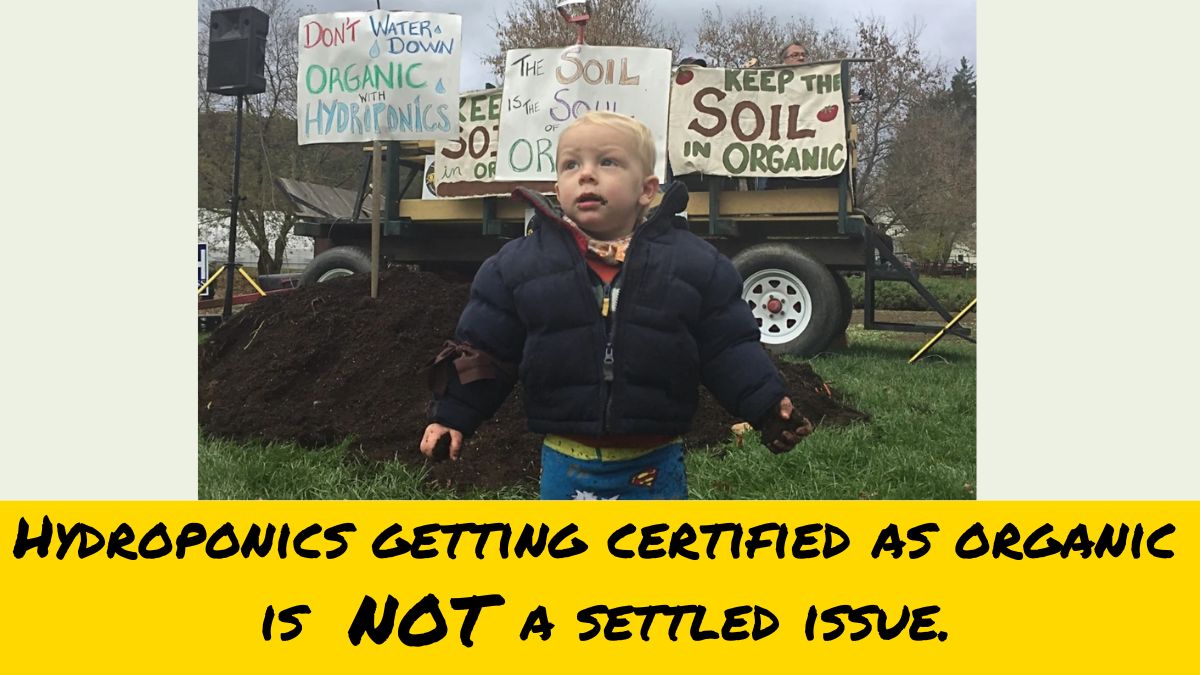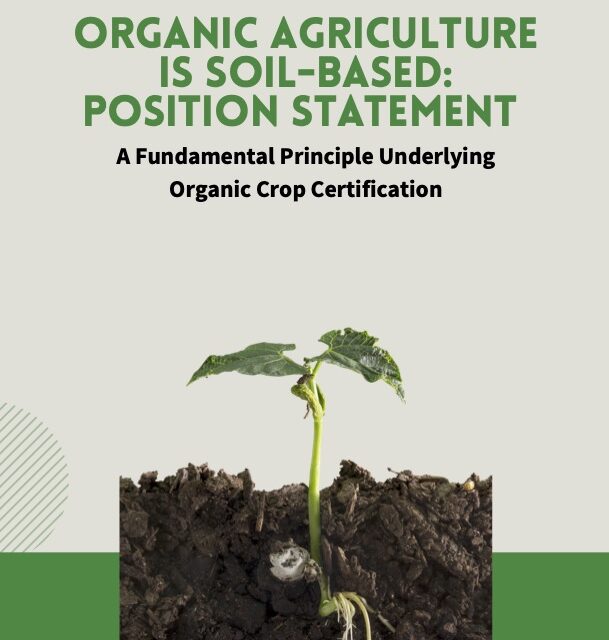A handful of highly respected organic certifiers have been quietly meeting for the last two years, creating a position paper on why they refuse to break the law by certifying hydroponic production. Their refusal has not made the USDA happy.
Real Organic Project has been part of these meetings and together we have created a short public statement that we are asking you to sign onto today. We NEED your support. Massive campaigns of public opinion have had power before. When the USDA tried to permit GMOs, irradiation, and sewage sludge in their first proposed organic standards, public outcry reversed their position. We can do it again.
The certifiers came together as a group because the National Organic Program (NOP) has been quietly issuing “non-compliances” to certifiers for refusing to certify hydroponics as organic. The first to receive a non-compliance was the highly respected certifier OneCert. Founder Sam Welch served on the USDA Hydroponic Task Force. He exerts a great moral force on the organic program. Perhaps the NOP strategized that threatening certifiers one-by-one would keep them in line. Instead, these brave certifiers are now putting their jobs and organizations on the line by planting their flag on this hill and taking a stand.
The great debate on hydroponics in Organic has been going on for 13 years. 2010 was the first time that the NOSB seriously considered the issue, and their answer was clear. Hydroponics can NOT be considered organic. In fact, it was not a debate.
Looking back, it was an innocent time before there was so much money involved. We were kind of like kids playing poker with Monopoly money. Except the conversation wasn’t just a game. It was a serious discussion about what organic means. Stripped of corporate influence, the answer was pretty simple. Organic farming is based on the principle of building the health of the soil.
Those who have a deeper understanding of organic know this. Even the USDA knows this, or they knew it years ago before they “forgot” it. In the first USDA report on organic farming back in 1980, they described the basic principles of organic farming.
Soil is the Source of Life — Soil quality and balance (that is, soil with proper levels of organic matter, bacterial and biological activity, trace elements, and other nutrients) are essential to the long-term future of agriculture. Human and animal health are directly related to the health of the soil.
Feed the Soil, Not the Plant — Healthy plants, animals, and humans result from balanced, biologically active soil.
–1980 USDA report on Organic Farming
https://naldc.nal.usda.gov/download/CAT80742660/PDF
The Federal law that caused the creation of the National Organic Program understood this as well. The Organic Food Production Act is one of the most enlightened laws ever to pass Congress. It isn’t easy to pass such a law, but it was a lot easier before there was so much money involved.
THIS POSITION WAS DEVELOPED BY:

The organic movement faces the same problem that every movement faces in our market economy. We want to spread the word far and wide. We want people to have access to good organic food. And we want to build a virtuous cycle of supply and demand for food grown with care for the soil.
After we began to succeed, large companies pushed into the organic space. And the conversations changed. Only two years after the 2010 National Organic Standards Board recommendation called for the prohibition of hydroponics in organic, hydroponics started to be approved by some of the major certifiers! At the same time, several huge agricultural brands decided that growing hydroponically
And they succeeded. By the hydro corporations’ own reckoning, so-called ”Hydroponic Organic” is now a billion-dollar industry.
It was almost a velvet revolution of quietly subverting the organic standards. There was no dramatic fight. Just the quiet work of nudging government bureaucrats. It almost went unnoticed. Instead, they are now rewriting history to portray the organic movement itself as being “divisive” and creating a “wedge issue” around soil.
Wait. Who is being “divisive”? Who is dividing whom?
While most of the country has slipped into a kind of overwhelmed numbness, this handful of organic certifiers have taken a stand. It is not easy to tell the sheriff that what they are doing is illegal, especially when you work for them. We wish that our government was the government that we dreamed of when we were kids. As it turns out, things are more complicated. As we see where our government has failed, we must gather together to create the needed change. The people lead. The government follows. Let us meet their failures with hope rather than cynicism. But also with resolve. These problems won’t just go away.
There is no one to turn to to fix this. We will have to do it ourselves. But there are a lot of us. If we come together, there is little that we can’t accomplish.
So PLEASE. Join the 60+ organizations that have given their public support for this position paper. Do it right now. It will only take a minute. We will make sure that the Secretary of Agriculture, the National Organic Program, and our representatives in Congress all see your support.
Click Here to read the Organic Agriculture is Soil-Based Position Statement



